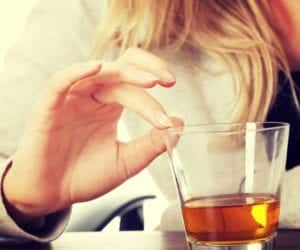Prescription Drugs to Stop Drinking Alcohol

Prescription Drugs to Stop Drinking Alcohol: The Three Most-Used Medications
Stopping an alcohol addiction can be a daunting task; some people relapse even after going through a rehab program due to the chronic, relapsing nature of the disease. In fact, during an addict’s first year of stopping alcohol abuse, as many as 40 to 60 percent relapse, according to a Journal of the American Medical Association article. However, there are medications available today that can make long-term sobriety much easier. In this article, we will explore the three main prescription drugs to stop drinking alcohol in detail.
Curious about rehab? Click here for information on our treatment programs.
Naltrexone
Naltrexone is one of the prescription drugs to stop drinking alcohol.When a person takes the medication, they don’t feel anything, but when they try to drink alcohol, they don’t get any of the usual reward that they’d expect to get. It is given to people after they’ve been through the initial detoxification phase.
Instead of the usual relaxation that alcohol gives, a person who drink son this medication to stop drinking, they will feel drunk, but without any of the normal rewards they get for drinking, creating an empty relationship with alcohol. Not only does Naltrexone have this effect when drinking, but it also helps to reduce cravings for alcohol.
A person may be given a daily tablet or they can opt for a monthly injection. It is one of the medications for alcoholism that can assist in lowering the amount of alcohol a person consumes along with complete cessation of alcohol use.
Disulfiram
Another of the effective prescription drugs to stop drinking alcohol is disulfiram. It works by changing the way the body breaks down alcohol; instead of the usual reward, the person is instantly met with severe sickness, which passes as the alcohol does. In a sense, it’s as if the body is having an allergic reaction to alcohol.
The times that most people swear that they will never drink again is the next morning when they are met with a severe hangover. Once the person starts to associate alcohol as a negative drug, then maintaining sobriety becomes easier. However, it may require that a person enlist the help of another to ensure that the recovering person always takes their medications for alcoholism. For some, disulfiram is daily medication, while for others, it may only be required when they crave alcohol.
Acamprosate
The last of the most-used prescription drugs to stop drinking alcohol is acamprosate. For some, withdrawal symptoms can last more than the usual 5 to 7 days; symptoms such as depression, restlessness, and anxiety can be present for months making it very difficult to carry on with a normal, fulfilling life without relapsing. Acamprosate is a medication to stop drinking that helps to not only deal with the initial withdrawal symptoms, reducing their severity, but it can be an effective long-term solution for those that experience post-acute withdrawal syndrome.
The abnormalities caused by alcohol dependence causes the GABA and glutamate balance to be thrown off, which sometimes last long after detoxification. This can result in anxiety and depression among others. Acamprosate helps to rebalance this system, providing the individual with more emotional stability.
Along with these three medications, there are other drugs that can assist during the withdrawal phase, including over-the-counter medications.However, these three medications are the most used and will be a perfect fit for nearly any person that is struggling to get their drinking under control.For more help on the subject, contact WhiteSands today at (877) 855-3470.
If you or a loved one needs help with abuse and/or treatment, please call the WhiteSands Treatment at (877) 855-3470. Our addiction specialists can assess your recovery needs and help you get the addiction treatment that provides the best chance for your long-term recovery.
